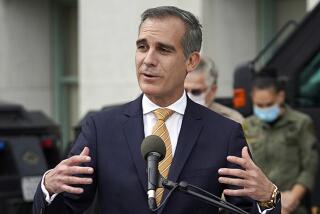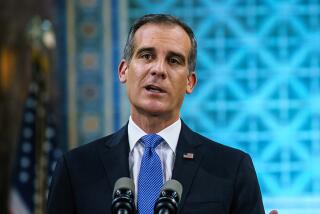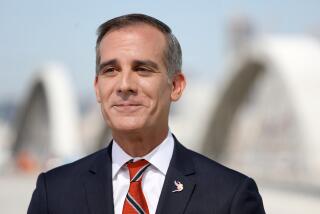Cranston Charges Bush Nominee Knew of Contra Aid
- Share via
WASHINGTON — In a belated echo of the Iran-Contra affair, Sen. Alan Cranston (D-Calif.) charged Thursday that the Bush Administration is “stonewalling” Congress about the role played by aides to then-Vice President George Bush in providing secret aid to Nicaraguan rebels.
Cranston used a Senate Foreign Relations Committee hearing to press an effort to block confirmation of Bush’s nominee as ambassador to South Korea, Donald P. Gregg, but he said that the panel’s investigation of Gregg has been hampered by the Administration.
‘Important Questions’
“Many important questions may never be answered satisfactorily, especially because we’ve been stonewalled by the Administration,” he said. “The National Security Agency has rejected our legitimate inquiries out of hand. . . . The State Department’s response was utterly non-responsive.”
Cranston also released new evidence that he said suggested that Gregg, who was Bush’s national security adviser during the Ronald Reagan Administration, knew more about secret aid to the Nicaraguan Contras than he has acknowledged.
But Gregg rejected Cranston’s charges as “a conspiracy theory,” and Republican members of the committee said they believed the Administration had cooperated adequately with the inquest.
Several senators said that in the absence of a “smoking gun,” Gregg is likely to win confirmation as ambassador to Seoul.
“He’ll do fine,” Sen. Frank H. Murkowski (R-Alaska) said.
Cranston has charged that Gregg, a former CIA officer, was involved in the secret efforts of White House aide Oliver L. North to provide aid to the Contras during the period when Congress had prohibited U.S. funding for the rebels.
He has accused Gregg of “misleading” the committee by denying that he knew anything about North’s covert operations in Central America during 1985 and 1986.
But Gregg stuck to his account that, despite several meetings with North and others involved in the operation, he did not realize what was going on until it was exposed in news accounts at the end of 1986.
“It wasn’t that I was hiding anything,” he said. “I just didn’t put it together.”
When he finally did learn what had been going on, Gregg added: “I was furious at North, I felt very let down by (his associate) Felix (Rodriguez) and I faulted myself for not putting the pieces together.”
Cranston released a memorandum written by a North aide which indicated that Rodriguez was working with North to help the Contras as early as January, 1985. Gregg had contended that Rodriguez did not work on the Contra effort until September, 1985, but confronted with the memorandum, conceded that Rodriguez might have misled him.
Cranston and other Democratic senators also called on the White House to seek the release of North’s notebooks, which include detailed records of the aide’s dealing with Gregg and others. Congress has been given only heavily censored copies of the notebooks, in which huge portions have been blacked out by North himself.
“This is like Doonesbury, only worse,” said Cranston, displaying an ink-blotched page of the notebooks. By “Doonesbury,” he was apparently referring to the comic strip, whose panels this week have included, in a self-parody, massive ink blots.
Sen. John Kerry (D-Mass.) said: “I’m willing to vote for Mr. Gregg if we will get the notebooks. . . . Let’s get the documents.”
But Sen. Mitch McConnell (R-Ky.) noted that the committee has already subpoenaed North to turn over the notebooks and North has refused.
“It’s hard to go further than a subpoena,” he said.
The committee is scheduled to vote on Gregg’s nomination on Tuesday. Cranston said he would not predict the outcome.
“There are some senators who are uncertain,” he said.
More to Read
Get the L.A. Times Politics newsletter
Deeply reported insights into legislation, politics and policy from Sacramento, Washington and beyond. In your inbox twice per week.
You may occasionally receive promotional content from the Los Angeles Times.











